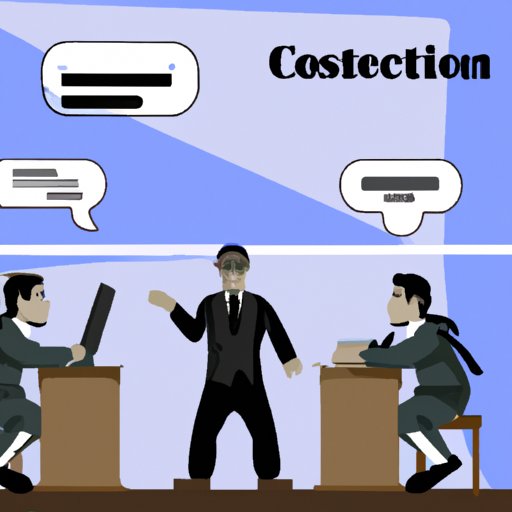Introduction
Computer science has become an increasingly important field in modern society, but there is still debate over whether it can be considered a true science. In order to understand this debate, it is first necessary to define what computer science is. According to the Association for Computing Machinery (ACM): “Computer science is the study of computers and algorithmic processes, including their principles, their hardware and software designs, their applications, and their impact on society.”
The debate over whether computer science counts as a true science revolves around questions of how it compares to traditional sciences, such as physics and chemistry. On one hand, some argue that computer science is a legitimate science because it involves rigorous research and experimentation. On the other hand, others argue that computer science is not a true science because it does not involve the same kind of hypothesis-driven inquiry that is characteristic of traditional sciences.
Examining the Debate: Does Computer Science Count as a True Science?
At the heart of the debate over whether computer science counts as a true science is the question of whether or not it meets the criteria for being considered a science. Proponents of computer science as a science point to its rigorous research and experimentation, as well as its use of scientific methods to solve problems. They argue that computer science is a legitimate science because it involves the application of scientific principles, such as logic and mathematics, to solve complex problems.
Opponents of computer science as a science argue that it does not meet the criteria for being considered a science because it does not involve hypothesis-driven inquiry. They point out that computer science is more focused on solving practical problems than on testing hypotheses, and that it relies heavily on trial and error rather than on the scientific method.
What is the Difference Between Computer Science and Traditional Science?
Despite the differences in approach, there are some similarities between computer science and traditional sciences. Both involve the application of scientific principles and techniques to solve complex problems, and both rely on experimentation and data analysis to reach conclusions. The main difference is that traditional sciences involve hypothesis-driven inquiry, while computer science does not.
Another key difference between computer science and traditional science is the role of technology. Computer science relies heavily on technology, such as computers and software, to solve problems. Traditional sciences do not typically rely on technology in the same way, although advances in technology have enabled new kinds of scientific inquiry.
The Intersection of Technology and Science: How do Computer Science and Science Relate?
Although computer science and traditional sciences may seem quite different, they are actually closely related. Technology has enabled new ways of doing science, from analyzing data to simulating experiments. In addition, computer science has enabled scientists to explore new areas of research and to make new discoveries. For example, computer simulations have been used to study the behavior of particles in quantum mechanics, and computer algorithms have been used to analyze vast amounts of genetic data to identify genes associated with diseases.
Computer science has also enabled the development of new technologies, such as artificial intelligence, robotics, and machine learning. These technologies have enabled new applications in the fields of medicine, agriculture, and transportation, among many others.
Exploring the Merits of Computer Science as an Academic Discipline
As an academic discipline, computer science offers many benefits. It provides a foundation for understanding how computers work and how to develop software applications. It also teaches students how to think logically and solve problems, skills that are essential in the modern workplace. In addition, computer science provides an excellent opportunity for students to learn coding and programming, skills that are in high demand in the job market.
Computer science also has numerous practical applications. It is used in many fields, such as engineering, medicine, finance, and education. It is also used to develop new technologies and products, such as self-driving cars and virtual reality systems.
Is Computer Science Really Science? An Analysis of the Argument
To determine whether computer science counts as a true science, it is necessary to examine the evidence both for and against its classification as a science. Proponents of computer science as a science point to its rigorous research, experimentation, and use of scientific methods to solve problems. They also point to its use in traditional sciences, such as genetics and quantum mechanics, as evidence of its legitimacy as a science.
Opponents of computer science as a science argue that it does not involve hypothesis-driven inquiry and that it relies too heavily on trial and error rather than on the scientific method. They also point out that computer science is largely focused on solving practical problems, rather than on testing hypotheses, and that it does not necessarily involve the same level of rigor as traditional sciences.
Conclusion
The debate over whether computer science counts as a true science is ongoing. Proponents of computer science as a science point to its rigorous research and experimentation, as well as its use of scientific methods to solve problems. Opponents of computer science as a science argue that it does not involve hypothesis-driven inquiry and that it relies too heavily on trial and error rather than on the scientific method.
Ultimately, the answer to the question of whether computer science counts as a true science depends on how one defines science. While computer science may not involve the same kind of hypothesis-driven inquiry that is characteristic of traditional sciences, it does involve the application of scientific principles and techniques to solve complex problems. As such, it can be argued that computer science does indeed count as a true science.
(Note: Is this article not meeting your expectations? Do you have knowledge or insights to share? Unlock new opportunities and expand your reach by joining our authors team. Click Registration to join us and share your expertise with our readers.)
